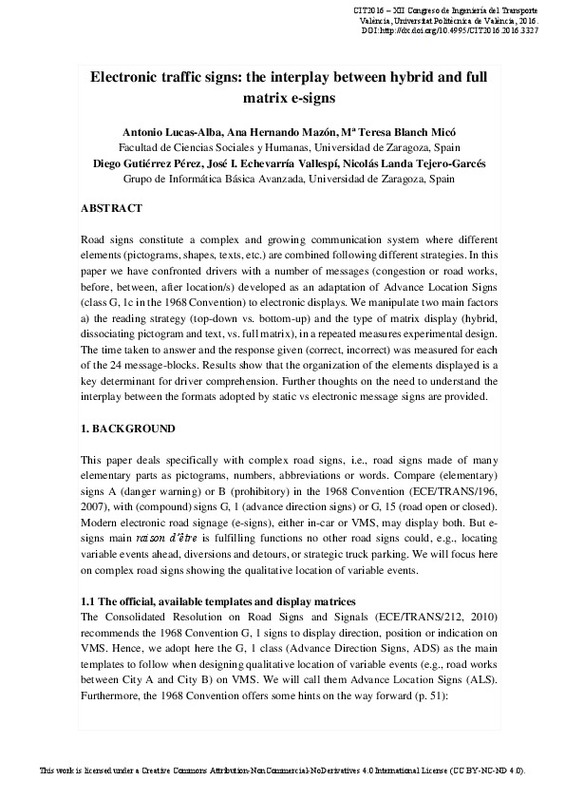JavaScript is disabled for your browser. Some features of this site may not work without it.
Buscar en RiuNet
Listar
Mi cuenta
Estadísticas
Ayuda RiuNet
Admin. UPV
ELECTRONIC TRAFFIC SIGNS: THE INTERPLAY BETWEEN HYBRID AND FULL MATRIX E-SIGNS
Mostrar el registro sencillo del ítem
Ficheros en el ítem
| dc.contributor.author | Lucas-Alba, Antonio
|
es_ES |
| dc.contributor.author | Hernando Mazón, Ana
|
es_ES |
| dc.contributor.author | Blanch Micó, María Teresa
|
es_ES |
| dc.contributor.author | Gutiérrez Pérez, Diego
|
es_ES |
| dc.contributor.author | Echeverría Villaspí, José
|
es_ES |
| dc.contributor.author | Landa Tejero-Garcés, Nicolás
|
es_ES |
| dc.date.accessioned | 2017-10-30T13:29:38Z | |
| dc.date.available | 2017-10-30T13:29:38Z | |
| dc.date.issued | 2016-06-01 | |
| dc.identifier.isbn | 9788460899600 | |
| dc.identifier.uri | http://hdl.handle.net/10251/90252 | |
| dc.description.abstract | [EN] Road signs constitute a complex and growing communication system where different elements (pictograms, shapes, texts, etc.) are combined following different strategies. In this paper we have confronted drivers with a number of messages (congestion or road works, before, between, after location/s) developed as an adaptation of Advance Location Signs (class G, 1c in the 1968 Convention) to electronic displays. We manipulate two main factors a) the reading strategy (top-down vs. bottom-up) and the type of matrix display (hybrid, dissociating pictogram and text, vs. full matrix), in a repeated measures experimental design. The time taken to answer and the response given (correct, incorrect) was measured for each of the 24 message-blocks. Results show that the organization of the elements displayed is a key determinant for driver comprehension. Further thoughts on the need to understand the interplay between the formats adopted by static vs electronic message signs are provided. | es_ES |
| dc.format.extent | 8 | es_ES |
| dc.language | Inglés | es_ES |
| dc.publisher | Editorial Universitat Politècnica de València | es_ES |
| dc.relation.ispartof | XII Congreso de ingeniería del transporte. 7, 8 y 9 de Junio, Valencia (España) | es_ES |
| dc.rights | Reconocimiento - No comercial - Sin obra derivada (by-nc-nd) | es_ES |
| dc.subject | Road signs | es_ES |
| dc.subject | Electronic signs design | es_ES |
| dc.subject | 1968 Convention | es_ES |
| dc.title | ELECTRONIC TRAFFIC SIGNS: THE INTERPLAY BETWEEN HYBRID AND FULL MATRIX E-SIGNS | es_ES |
| dc.type | Capítulo de libro | es_ES |
| dc.type | Comunicación en congreso | es_ES |
| dc.identifier.doi | 10.4995/CIT2016.2015.3327 | |
| dc.rights.accessRights | Abierto | es_ES |
| dc.description.bibliographicCitation | Lucas-Alba, A.; Hernando Mazón, A.; Blanch Micó, MT.; Gutiérrez Pérez, D.; Echeverría Villaspí, J.; Landa Tejero-Garcés, N. (2016). ELECTRONIC TRAFFIC SIGNS: THE INTERPLAY BETWEEN HYBRID AND FULL MATRIX E-SIGNS. En XII Congreso de ingeniería del transporte. 7, 8 y 9 de Junio, Valencia (España). Editorial Universitat Politècnica de València. 2038-2045. https://doi.org/10.4995/CIT2016.2015.3327 | es_ES |
| dc.description.accrualMethod | OCS | es_ES |
| dc.relation.conferencename | CIT2016. Congreso de Ingeniería del Transporte | es_ES |
| dc.relation.conferencedate | June 07-09,2016 | es_ES |
| dc.relation.conferenceplace | Valencia, Spain | es_ES |
| dc.relation.publisherversion | http://ocs.editorial.upv.es/index.php/CIT/CIT2016/paper/view/3327 | es_ES |
| dc.description.upvformatpinicio | 2038 | es_ES |
| dc.description.upvformatpfin | 2045 | es_ES |
| dc.type.version | info:eu-repo/semantics/publishedVersion | es_ES |
| dc.relation.pasarela | OCS\3327 | es_ES |








